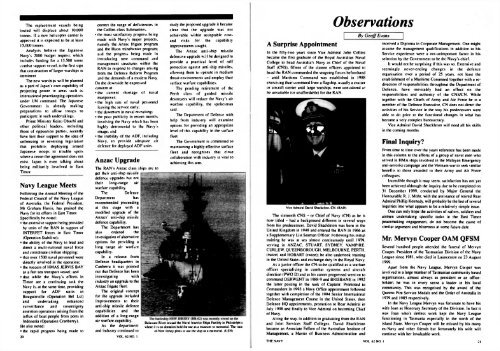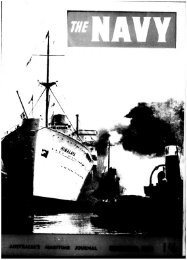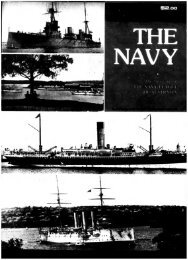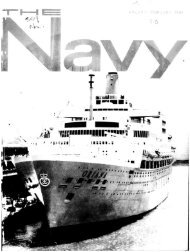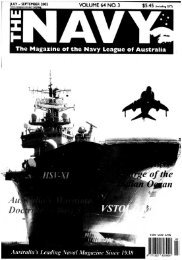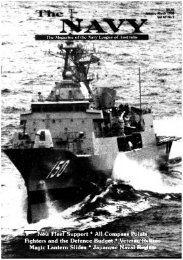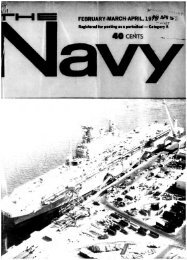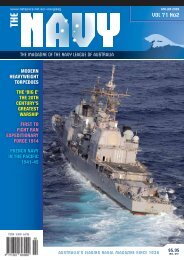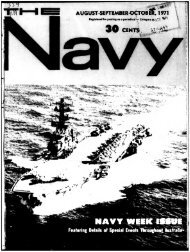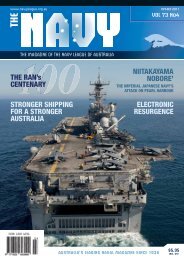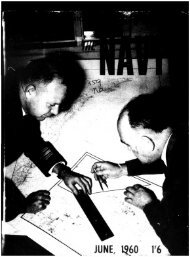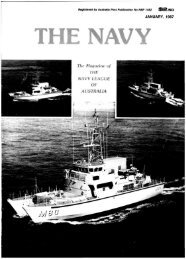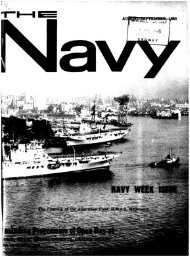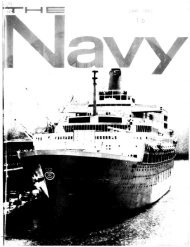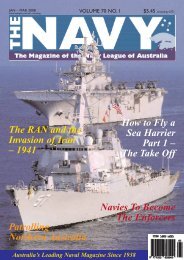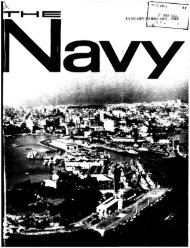Indian Naval Expansion Maritime - Navy League of Australia
Indian Naval Expansion Maritime - Navy League of Australia
Indian Naval Expansion Maritime - Navy League of Australia
You also want an ePaper? Increase the reach of your titles
YUMPU automatically turns print PDFs into web optimized ePapers that Google loves.
The replacement vessels being<br />
touted will displace about 10.000<br />
tonnes. If a new helicopter carrier is<br />
approved it is expected to be at least<br />
15.000 tonnes.<br />
Analysts believe the Japanese<br />
<strong>Navy</strong>'s 2000 budget request, which<br />
includes funding for a 13.500 tonne<br />
combat support vessel, is the first sign<br />
that construction <strong>of</strong> larger warships is<br />
imminent<br />
The new warships will be planned<br />
as a part <strong>of</strong> Japan's own capability <strong>of</strong><br />
projecting power in areas such as<br />
international peacekeeping operations<br />
under UN command. The Japanese<br />
Government is already making<br />
preparations to allow troops to<br />
participate in such undertakings.<br />
Prime Minister Keizo Obuchi and<br />
other political leaders, including<br />
those <strong>of</strong> opposition parties, recently<br />
have lent their support to the idea <strong>of</strong><br />
unfreezing or reversing legislation<br />
that prohibits deploying armed<br />
Japanese troops to trouble spots<br />
where a cease-fire agreement does not<br />
exist. Japan is even talking about<br />
being militarily involved in East<br />
Timor.<br />
<strong>Navy</strong> <strong>League</strong> Meets<br />
Following the Annual Meeting <strong>of</strong> the<br />
Federal Council <strong>of</strong> the <strong>Navy</strong> <strong>League</strong><br />
<strong>of</strong> <strong>Australia</strong>, the Federal President,<br />
Mr Graham Harris, has praised the<br />
<strong>Navy</strong> for its efforts in East Timor.<br />
Specifically he noted:<br />
• the extensive support being provided<br />
by units <strong>of</strong> the RAN in support <strong>of</strong><br />
INTERFET forces in East Timor<br />
(Operation Stabilise);<br />
• the ability <strong>of</strong> the <strong>Navy</strong> to lead and<br />
direct a multi-national naval force<br />
and coordinate civilian shipping:<br />
• that over 1500 naval personnel were<br />
directly involved in the operation:<br />
• the success <strong>of</strong> HMAS JERVIS BAY<br />
as a fast sea transport vessel: and<br />
• that while the <strong>Navy</strong>'s efforts in<br />
Timor are a continuing task the<br />
<strong>Navy</strong> is. at the same time, providing<br />
support for ADF units in<br />
Bougainville (Operation Bel Lsi)<br />
and undertaking enhanced<br />
surveillance and sovereignty<br />
assertion operations arising from the<br />
influx <strong>of</strong> boat people from ports in<br />
Indonesia (Operation Cranberry).<br />
He also noted:<br />
• the rapid progress being made to<br />
20<br />
correct the range <strong>of</strong> deficiencies in<br />
the Collins class Submarines.<br />
• the most satisfactory progress being<br />
made with <strong>Navy</strong>'s major projects,<br />
namely the Anzac frigate program<br />
and the Huon minehunter program;<br />
and !he progress being made in<br />
introducing new command and<br />
management structures within the<br />
RAN to respond to changes arising<br />
from the Defence Reform Program<br />
and the demands <strong>of</strong> a modern <strong>Navy</strong>.<br />
On the downside he expressed<br />
concern at:<br />
• the current shortage <strong>of</strong> naval<br />
manpower;<br />
• the high rate <strong>of</strong> naval personnel<br />
leaving the service early;<br />
• the downturn in naval recruiting;<br />
• the poor publicity in recent months<br />
involving the <strong>Navy</strong> which has been<br />
highly detrimental to the <strong>Navy</strong>'s<br />
image: and<br />
• the inability <strong>of</strong> the ADF. including<br />
<strong>Navy</strong>, to provide adequate air<br />
defence for deployed ADF units.<br />
Anzac Upgrade<br />
The RAN's Anzac class ships are to<br />
gel their anti-ship missile<br />
defence upgrades but not<br />
their long-range air<br />
warfare capability.<br />
The Defence<br />
Department<br />
has<br />
recommended proceeding<br />
at this stage with a<br />
modified upgrade <strong>of</strong> the<br />
Anzacs' anti-ship missile<br />
defence capability.<br />
The Department has<br />
also ordered the<br />
investigation <strong>of</strong> alternative<br />
options for providing a<br />
long range air warfare<br />
capability.<br />
In a release from<br />
Defence headquarters in<br />
Canberra it was pointed<br />
out that Defence has been<br />
investigating with<br />
industry an upgrade to the<br />
Anzac frigate fleet.<br />
The original concept<br />
for the upgrade included<br />
improvements to their<br />
anti-ship missile defence<br />
capabilities and the<br />
addition <strong>of</strong> a long-range<br />
air warfare capability.<br />
Delaware River toward the <strong>Naval</strong> Inactive Ships Facility in Philadelphia<br />
As the department where it is on donation hold for use as a museum or memorial. The state<br />
and industry continued to<br />
VOL. 62 NO. I<br />
study the proposed upgrade it became<br />
clear that the upgrade was not<br />
achievable within acceptable costs<br />
and risks for the capability<br />
improvements sought.<br />
The Anzac anti-ship missile<br />
defensive upgrade will be designed to<br />
provide a practical level <strong>of</strong> self<br />
protection against anti-ship missiles,<br />
allowing them to operate in medium<br />
threat environments and employ their<br />
surface warfare capabilities.<br />
The pending retirement <strong>of</strong> the<br />
Perth class <strong>of</strong> guided missile<br />
destroyers will reduce the <strong>Navy</strong>'s air<br />
warfare capability, the spokesman<br />
said.<br />
The Department <strong>of</strong> Defence with<br />
help from industry will examine<br />
options for providing an appropriate<br />
level <strong>of</strong> this capability in the surface<br />
fleet.<br />
The Government is committed to<br />
maintaining a highly effective surface<br />
fleet and recognises that close<br />
collaboration with industry is vital to<br />
achieving this aim.<br />
<strong>of</strong> New Jersey plans to use the ship as a memorial. (USN)<br />
A Surprise Appointment<br />
In the fifty-two years since Vice Admiral John Collins<br />
became the first graduate <strong>of</strong> the Royal <strong>Australia</strong>n <strong>Naval</strong><br />
College to head <strong>Australia</strong>'s <strong>Navy</strong> as Chief <strong>of</strong> the <strong>Naval</strong><br />
Staff (CNS). fifteen <strong>of</strong> the sixteen <strong>of</strong>ficers appointed to<br />
head the RAN commanded the seagoing forces beforehand<br />
- until <strong>Maritime</strong> Command was established in 1988<br />
exercising their command from a flagship, usually a cruiser<br />
or aircraft carrier until large warships were considered to<br />
be unsuitable (or unaffordable) for the RAN.<br />
Uk n %<br />
Vice Admiral David Shackelton. CN. (RAN)<br />
The sixteenth CNS - or Chief <strong>of</strong> <strong>Navy</strong> (CN) as he is<br />
now titled - had a background different in several ways<br />
from his predecessors. David Shackleton was born in the<br />
United Kingdom in 1948 and entered the RAN in 1966 as<br />
a Supplementary List Seaman Officer. Following his initial<br />
training he was at sea almost continuously until 1979.<br />
serving in ANZAC. STUART. SYDNEY. VAMPIRE.<br />
CURLEW. Ql'EENBOROUGH. MELBOURNE. PERTH,<br />
(twice) and HOBART (twice); he also undertook training<br />
in the United States and exchange duty in the Royal <strong>Navy</strong>.<br />
As a junior <strong>of</strong>ficer the CN-to-be qualified as a warfare<br />
<strong>of</strong>ficer specialising in combat systems and aircraft<br />
direction (PWO D) and as his career progressed went on to<br />
command DERWENT in 1988-9 and BRISBANE in 1992<br />
the latter posting in the rank <strong>of</strong> Captain: Promoted to<br />
Commodore in 1993 a <strong>Navy</strong> Office appointment followed<br />
together with completion <strong>of</strong> the 1994 Senior International<br />
Defence Management Course in the United States, then<br />
Defence HQ appointments, promotion to Rear Admiral in<br />
July 1998 and finally to Vice Admiral on becoming Chief<br />
<strong>of</strong> <strong>Navy</strong>.<br />
Along the way. in addition to graduating from the RAN<br />
and Joint Services Staff Colleges. David Shackleton<br />
became an Associate Fellow <strong>of</strong> the <strong>Australia</strong>n Institute <strong>of</strong><br />
Management, a Master <strong>of</strong> Business Administration and<br />
Observations<br />
By Ge<strong>of</strong>f Evans<br />
received a Diploma in Corporate Management. One might<br />
assume the management qualifications in addition to his<br />
Service experience were a not-unimportant factor in his<br />
selection by the Government to be the <strong>Navy</strong>'s chief.<br />
It would not be surprising if this was so. Extensive and<br />
seemingly never-ending changes in the defence<br />
organisation over a period <strong>of</strong> 25 years, not least the<br />
establishment <strong>of</strong> a <strong>Maritime</strong> Command together with a redirection<br />
<strong>of</strong> responsibilities throughout the Department <strong>of</strong><br />
Defence, have inevitably had an effect on the<br />
responsibilities and authority <strong>of</strong> the CNS/CN. While<br />
together with the Chiefs <strong>of</strong> Army and Air Force he is a<br />
member <strong>of</strong> the Defence Executive. CN does not direct the<br />
activities <strong>of</strong> his Service in the way his predecessors were<br />
able to do prior to the functional changes in what has<br />
become a very complex bureaucracy.<br />
Vice Admiral David Shackleton will need all his skills<br />
in the coming months.<br />
Final Inquiry?<br />
From time to time over the years reference has been made<br />
in this column to the efforts <strong>of</strong> a group <strong>of</strong> naval men who<br />
served in HMA ships involved in the Malayan Emergency<br />
anti-terrorist campaign and the Vietnam war to seek similar<br />
benefits to those awarded to their Army and Air Force<br />
colleagues.<br />
Incredible though it may seem, satisfaction has not yet<br />
been achieved although the inquiry due to be completed on<br />
31 December 1999. conducted by Major General the<br />
Honourable R. J. Mohr. with the assistance <strong>of</strong> retired Rear<br />
Admiral Phillip Kennedy, will probably be the last <strong>of</strong> several<br />
inquiries into what appears to be a relatively simple issue.<br />
One can only hope the activities <strong>of</strong> sailors, soldiers and<br />
airmen undertaking specific tasks in the East Timor<br />
peacemaking engagement, do not become the cause <strong>of</strong><br />
similar argument and bitterness at some future date<br />
Mr. Mervyn Cooper OAM QFSM<br />
Several hundred people attended the funeral <strong>of</strong> Mervyn<br />
Cooper. President <strong>of</strong> the Tasmanian Division <strong>of</strong> the <strong>Navy</strong><br />
<strong>League</strong> since 1981. who died in Launceston on 23 August<br />
1999.<br />
Apart from the <strong>Navy</strong> <strong>League</strong>. Mervyn Cooper was<br />
involved in a large number <strong>of</strong> Tasmanian community based<br />
organisations, almost always as president or an <strong>of</strong>ficeholder:<br />
he was in every sense a leader in his local<br />
community. This was recognised by the award <strong>of</strong> the<br />
Queens Fire Service Medals and the Order <strong>of</strong> <strong>Australia</strong> in<br />
1979 and 1985 respectively.<br />
In the <strong>Navy</strong> <strong>League</strong> Mervyn was fortunate to have his<br />
wife Joan as Honorary Secretary <strong>of</strong> the Division. In fact it<br />
was Joan who's tireless work kept the <strong>Navy</strong> <strong>League</strong><br />
functioning in Tasmania especially in the north <strong>of</strong> the<br />
island State. Mervyn Cooper will be missed by his many<br />
ex-<strong>Navy</strong> and other friends but fortunately his wife will<br />
continue with her invaluable work.<br />
THE NAVY VOL. 62 NO. I 21


